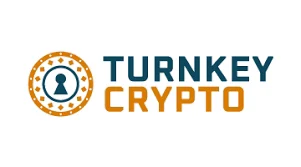Crypto Wallet Builder Turnkey Secures $30M to Advance API-Based Wallet Development
Introduction: Turnkey Secures Major Funding to Power the Next Generation of Crypto Wallets
In a significant step toward reshaping the crypto wallet infrastructure landscape, Turnkey, a crypto wallet infrastructure startup, has successfully raised $30 million in Series B funding. The funding round was led by Bain Capital Crypto and included participation from notable investors such as Lightspeed Faction and Galaxy Ventures. With its latest round, Turnkey aims to expand its engineering capabilities and further simplify wallet integration through advanced developer-friendly APIs.
This funding signals strong investor confidence in Turnkey’s mission to enable the next evolution of blockchain-based applications — ones that require fast, scalable, and user-friendly wallet solutions.
Turnkey: Building the Future of Crypto Wallet Infrastructure
Founded by former Coinbase employees Bryce Ferguson and Jack Kearney, Turnkey was created with the vision of removing friction in crypto wallet interactions. The company's platform allows developers to build seamless, secure, and scalable wallets without the complex backend typically involved in wallet infrastructure.
At its core, Turnkey offers wallet APIs that streamline user experiences, removing the traditional bottlenecks that plague legacy wallet systems. The goal is to modernize wallet tech so it can keep pace with the broader crypto and Web3 ecosystem.
According to co-founder Bryce Ferguson, “We’re moving from this world of slow, clunky systems designed for buying and holding crypto to high-throughput, machine-based transactions.”
This shift from static storage to dynamic interaction requires an overhaul of how wallets are built — and that’s exactly where Turnkey comes in.
Developer Tools at the Center of Turnkey’s Growth Strategy
Turnkey’s primary value proposition lies in its API-based crypto wallet infrastructure, which is purpose-built for developers who want to create seamless user experiences.
APIs allow developers to customize wallet behavior, integrate features with existing platforms, and manage user assets without needing to maintain complex wallet systems themselves. This is especially useful for high-velocity applications such as decentralized finance (DeFi), gaming, NFTs, and prediction markets.
Turnkey already serves a variety of clients from different crypto sectors, including:
Prediction market platforms
NFT marketplaces
These integrations highlight Turnkey’s adaptability across blockchain use cases, making it a compelling choice for developers building the next generation of decentralized applications (dApps).
Strong Investor Support in a Challenging Market
Turnkey’s $30 million Series B raise comes on the heels of a $15 million Series A funding round in April 2024, which was led by the same key investors: Lightspeed Faction and Galaxy Ventures.
The fact that these major players returned for the Series B round demonstrates continued belief in Turnkey’s long-term roadmap. The funding is particularly noteworthy considering the broader crypto funding landscape, where investment has become more selective.
According to sources familiar with the matter, Turnkey plans to use this capital infusion to scale its headcount, with a major focus on expanding its engineering team. As of now, the company employs around 35 people.
The fresh funding will also go toward scaling Turnkey’s core infrastructure, investing in product development, and onboarding new partners across the blockchain ecosystem.
Why Turnkey’s Wallet APIs Matter in Today’s Crypto Landscape
The need for improved wallet infrastructure is more pressing than ever. While crypto adoption is rising, poor user experience remains a bottleneck, particularly when it comes to wallet usability, recovery, and integration.
Turnkey's API-first model is solving this by offering:
Customizable wallet features
Embedded wallet functionality for applications
Multi-chain compatibility
High-speed transaction handling
These improvements reduce friction for both developers and users, offering a seamless onboarding process into Web3. This is crucial for expanding the reach of crypto applications beyond tech-savvy early adopters and into mainstream use cases.
Competing in the Crypto Wallet Infrastructure Space
Turnkey operates in a competitive space, with several players vying to offer the best infrastructure for Web3 wallets. What sets Turnkey apart is its enterprise-level focus, scalability, and alignment with developer needs.
Instead of offering a simple consumer-facing wallet, Turnkey is building the infrastructure layer that empowers developers to customize wallet experiences, bringing flexibility and security into their hands.
This developer-first approach is helping Turnkey stand out in a sea of crypto wallet services that often focus on end users. By going deeper into the tech stack, Turnkey is positioning itself as an essential building block for any serious blockchain application.
Turnkey’s Vision: Crypto Wallets Without Compromise
As blockchain technology advances, the demand for fast, secure, and programmable wallets continues to grow. Traditional wallets designed for holding tokens aren’t equipped to handle real-time transaction systems such as DeFi protocols, automated market makers, or dynamic NFT platforms.
Turnkey envisions a world where crypto wallets are no longer clunky interfaces but integrated backend systems that operate invisibly — powering apps, automations, and complex logic with minimal user friction.
By combining robust APIs with enterprise-grade security and compliance features, Turnkey aims to offer a solution that’s both developer-friendly and scalable for mass adoption.
The Road Ahead for Turnkey
Looking forward, Turnkey will focus on:
Expanding its engineering team to build more features
Scaling wallet infrastructure for large enterprises and high-throughput apps
Onboarding new clients from emerging Web3 sectors
Strengthening its developer tools and documentation
As Web3 applications continue to mature, the demand for flexible wallet infrastructure is only expected to grow. If Turnkey can execute its roadmap, it could play a pivotal role in powering the next generation of crypto-native applications.
Conclusion: Turnkey Solidifies Its Role in Crypto's Infrastructure Boom
Turnkey’s $30 million Series B funding round marks a significant milestone in the company’s journey to modernize crypto wallet infrastructure. With its developer-first approach and robust API suite, Turnkey is addressing one of the crypto industry's biggest challenges: scalable, user-friendly wallet solutions.
As the crypto market moves toward more utility-driven and interactive applications, platforms like Turnkey will be instrumental in supporting that transition. Whether it's DeFi, NFTs, stablecoin payments, or decentralized prediction markets, the need for flexible wallet infrastructure is here — and Turnkey is well-positioned to meet it.

Comments
Post a Comment